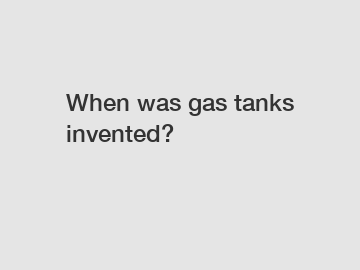When was gas tanks invented?
In today's fast-paced world, it's easy to take the convenience of automobiles for granted. As we drive our cars, seldom do we think about the marvels of engineering that allow us to go the distance: one such innovation is the gas tank. Join us on a fascinating journey through time as we explore the invention of gas tanks and their incredible influence on the automotive industry.
The Birth of the Gas Tank:
To fully appreciate the invention of gas tanks, we must travel back to the late 19th century. As the first automobiles emerged, the need for efficient fuel storage quickly became apparent. Before gas tanks, gasoline was stored in a variety of ways, such as in buckets or containers on the carriages. However, these methods were far from safe, leading to frequent accidents and spills.

In 1896, the German engineer Karl Benz revolutionized the automotive industry with the development of what is widely recognized as the first practical automobile. This innovation coincided with the creation of the first gas tank, a pivotal moment that set the stage for the future of transportation.
Early Designs:
Initially, gas tanks were simple metal containers mounted on the vehicles. These first-generation tanks lacked the safety measures we have come to rely on today. However, engineers quickly realized the potential dangers of these rudimentary tanks and set out to improve their design.
By the early 1900s, manufacturers began experimenting with alternative materials like early forms of rubber and steel, hoping to enhance durability while reducing the risk of leakage or explosions. These advancements marked significant progress in the evolution of gas tanks.
Safety Comes First:
Notably, Ford played a crucial role in making gas tanks safer for everyone. Their 1928 Model A featured a steel-encased tank, situated between the rear bumper and the rear axle. This ingenious positioning ensured added protection from accidents, increasing consumer confidence in the safety of automobiles.
Post-War Advancements:
While FRP tanks offered durability and flexibility, polyethylene tanks boasted a lightweight design, rust resistance, and exceptional fuel preservation capabilities. These developments not only revolutionized gas tanks but also brought significant improvements to fuel economy, contributing to a greener and more sustainable automotive industry.
The Modern Era:
Gas tanks have continued to evolve rapidly in recent decades. Advanced engineering and cutting-edge technology have ushered in new features, such as fuel level sensors, to give drivers accurate readings. Additionally, innovations in tank designs have made them an integral part of aerodynamics, further improving fuel efficiency.
Conclusion:
Gas tanks, once a mere necessity for storing fuel, have transformed into ingenious devices with enhanced safety features and improved fuel efficiency. From their humble origins in the late 19th century to the modern innovations of today, gas tanks have played a crucial role in propelling the automotive industry forward.
As we reflect on the evolution of gas tanks, it's apparent that safety, efficiency, and environmental consciousness have guided their continuous improvement. The tireless efforts of engineers and manufacturers have shaped the automotive landscape, making our journeys safer, greener, and more enjoyable.
So the next time you fuel up your vehicle, take a moment to appreciate the incredible innovation inherent in that seemingly inconspicuous gas tank.
Want more information on LNG Storage solution, CNG Tube Skids, Industrial Gas Cylinder manufacturer? Feel free to contact us.
402
0
0


Comments
All Comments (0)